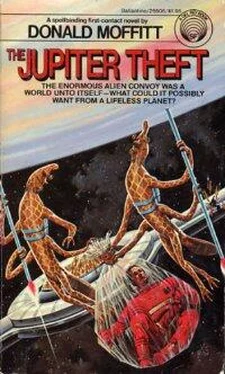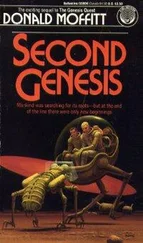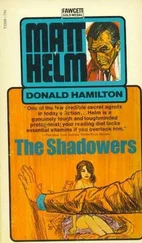“He didn’t know what he was saying,” Janet said.
“Yes he did,” said Jameson, and walked away quickly. Ruiz, Dmitri, and Maggie picked up their bundles when they saw him coming. Jameson shouldered his own parcel, slipping one arm through the loop at the knot, and moved past the clustered people at the gate without looking at their faces.
A dozen yards past the thick bars, he paused to look back. They were already pushing at the gate, sliding it shut. It fell into place with a solid thunk. The animals had locked themselves back in their cage.
“Wait a minute,” Dmitri called.
“Come on!” Jameson said. “There isn’t time for you to stop and look at specimens.”
“They’re trying to attract our attention,” Dmitri said.
Ruiz looked at the cage behind the wire mesh barrier. “He’s right,” he said. “Those creatures are intelligent.”
Jameson turned around and went up to the barrier for a closer look. It was the cage that held the feathery humanoids. The pixieish little creatures were swarming frantically over the bars, making urgent gestures with their delicate four-fingered hands.
“They’re cute,” Maggie said.
“They’re carnivores,” Dmitri said. “Look at those little pointed teeth.”
“Like a kitten’s!” Maggie responded indignantly.
“We’re carnivores too,” Ruiz said. “Gives us something in common with them.”
Jameson looked the creatures over. They were fluffy and flamingo-pink, with huge round violet eyes that gave them an astonished expression, like a tarsier. They had button noses and dainty underslung jaws that, head on, gave them an appealingly chinless appearance, like pink teddy bears. They sported tufted tails, which they kept winding around their waists or necks like feather boas.
And they had stacked a little pile of artifacts against the bars for demonstration purposes. A pair of little felt boots, too short for their feet until you noticed the four holes for toes to protrude through and rest on the projecting sole. A filigreed cup that could not have held anything, and seemed to have no purpose except to be beautiful. A miniature rake that was obviously a grooming comb.
“They had those ready to show us,” Ruiz said. “They were waiting.”
As if on cue, the two elfin beings went through a swift and well-organized pantomime. They became Klein murdering Tetrachord, and Triad streaking for the safety of the human compound. Then they took turns becoming Jameson and his three companions emerging, imitating posture and body language with amazing accuracy despite the differences in body structure. Finally, with unmistakable gestures, they begged to be taken along.
Jameson looked sorrowfully at the sheet of clear, almost invisible glass that sealed off the cage, between mesh and bars. There was no telling what kind of atmosphere the creatures breathed.
Feeling clumsy by comparison, he made a series of gestures to tell them that it would be fatal for them to breathe the Cygnan air.
The fuzzy little beings gestured back, more urgently, pantomiming the idea that they could breathe outside the glass case.
“What do you think?” Jameson said.
“They’re bright,” Ruiz said. “Bright and quick. They want out, and they seem to know what they’re doing. I feel sorry for them. Too bad we can’t help them.”
Jameson made up his mind. “I have a hunch they’ll be useful,” he said. “They’ve been prisoners of the Cygnans a lot longer than we have. They may know a thing or two.”
Ruiz was doing arithmetic in his head. He nodded agreement. “They’ve been on this ship a minimum of ten years subjective time, even assuming that the Cygnans picked them up on their last stop. And that their last stop was during the mid-twentieth century, when Cygnus X-1 was discovered—and the Cygnans would have been detected as well, if Cyg X-1 weren’t masking the final leg of their approach.”
Dmitri was looking worriedly at the extra gate and the glass. “The security precautions are extraordinary,” he said. “The Cygnans must consider them to be dangerous beasts.”
“They’re intelligent beings,” Jameson said, “who wear shoes and who while away the time while they’re locked up by carving ornamental cups.”
He pried at the wire mesh with his bare hands. The mesh was a warning, not a barrier, and it was intended for the one-third-g strength of Cygnans, not human muscles. With Ruiz and Dmitri helping him, he was able to tear an opening wide enough to squeeze through.
The glass was unbreakable. After a moment’s examination of its perimeter, Jameson found the round opening of a Cygnan keyhole. He fished in his pocket for the cylindrical key he’d taken from one of Triad’s pouches.
“Tod!” Maggie said quickly, “that glass is there for a reason. What if they’re not oxygen breathers? You’ll kill them.”
“It’s their decision,” Jameson said. “They say no.”
He pushed the cylinder into the hole. It twanged and jumped back into his hand. The glass panel slid aside.
They all held their breath, half expecting the smell of ammonia or methane. The two feathery humanoids regarded them gravely through the bars, unharmed. Jameson took a cautious sniff. There was a spicy smell, like cloves or cinnamon, but the cage seemed to contain the basic Cygnan atmosphere. There wasn’t even a pressure differential.
Why had they been glassed in?
“Germs,” Maggie said suddenly.
“Too late to worry about that now,” Jameson said. He found the lock, and the bars retreated into overhead sockets.
Before he knew it, two gossamer sprites were crowding round him, looking up at him with enormous violet eyes and jabbering at him in squeaky voices. They were no taller than twelve-year-olds. The spicy scent was stronger and rather nice.
“They’re thanking you,” Maggie said.
Up close, the rosy plumage turned out to be a silky nap of cobweb-fine hairs, that split and branched at the tips, like dandelion down. There was an almost irresistible impulse to plunge your hands into it and feel the softness. It was the down that fluffed them out to give an illusion of even moderate bulk. Underneath there was nothing to them—just a pliant, willowy frame with hardly any flesh on it. Wherever the fairy silk rippled and parted in response to stray air currents, they were all skin and fine bones and tendon. On Earth they wouldn’t have weighed more than fifty pounds apiece.
They bounded ahead like mischievous children, then stopped and looked back to see if the humans were following. Jameson grinned and picked up his bundle.
“Nocturnal species,” Dmitri said. “Notice the eyes? And it gets cold at night where they come from. The divaricated follicles of their coats provide good insulation, with a layer of trapped air next to the skin. I wouldn’t be surprised if the tips open and close to regulate temperature—much more efficient than the erectile follicles of terrestrial mammals.”
“They look so human! ” Maggie squealed. “Like little elves!”
“Only superficially,” Dmitri said, watching the two beings scamper ahead of them. “See those butterfly hips? And the articulation of the shoulder joints? And they’re not mammals.”
“Even so,’ Jameson said, “their resemblance to people is amazing. A coincidence…”
“Not amazing,” Dmitri said. “And no coincidence. There’s a limited number of efficient forms available to quadrupeds who become bipeds. The Cygnans must have collected thousands of life forms. They probably lumped their handful of humanoids together.”
He nodded toward the cage they were passing. The squat green troll within, with its knee-length beard and arms hanging to the ground, was obviously not intelligent. As it caught sight of them, the top of its head lifted like a lid and emitted a bellow; then it scampered away, upright but on all fours.
Читать дальше












